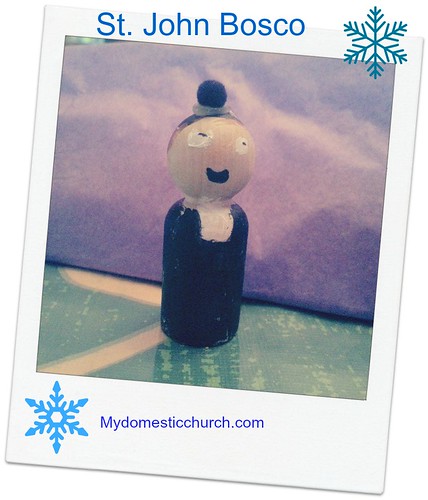
“Try very hard, young men, to imitate Jesus in His obedience. He should be your only model in this.”
“It is easier to become angry than to restrain oneself, and to threaten a boy than to persuade him.”
– Don Bosco


A Contemporary Saint
When I talk to my kids about the saints, I try to put them into a historical perspective. St. John Bosco lived from 1815 to 1888 in Italy. He was alive during the American Civil war and in fact, lived 21 years after the death of President Lincoln. John Bosco was canonized in 1934, a mere 46 years after his death and between the great world wars. By historical standards, John Bosco is a modern saint. My own mother was 5 years old at the time of John Bosco’s canonization. We also have photographs of this saint so to my mind, as saints go, Saint John Bosco is practically contemporary!
Who was John Bosco?
John Bosco was born in 1815 at the foot of the Italian Alps to Francis and Margaret Bosco. Just two years after his birth, Francis died and Margaret was left to raise three little boys by herself. But Margaret was an extraordinary woman. She told the boys that work was a privilege and that they all had to work together to keep the farm and the home. So little John learned to love to work and to find different ways of working.
The story goes that a priest once snubbed young John when he enthusiastically called out to him. That little heartache made the young boy resolve that when he grew up, he was always going to be kind to children and listen to them.
Also as a youngster, John Bosco received a vision from a “lady” that showed wolves becoming as lambs. Confused, he asked the lady what this meant and she told him, “This is the field of your work. Be humble, steadfast, and strong!”
The road to the priesthood was not easy. John was homeschooled by a local farmer until the age of 8. He learned to read and do simple math. Eventually, he had to leave home to go to school and work his way through. But each little job that he took gave him the opportunity to learn a new skill. He learned to blacksmith, juggle, walk a tightrope, tailer clothes, and even make shoes. All of these undertakings he did with joy and careful attention. But he always kept a balance in his life between work, study and recreation.
John Bosco entered the seminary at the age of 20. Five years later he was ordained. He prayed for the gift of oratory and he said later, “I think I got it!”
John Bosco is most known for his orphanage and trade school where he took care of orphaned boys and taught them skills helpful for their lives. Undoubtedly the skills John picked up as a shoemaker were very helpful to him with a place full of growing boys!
St. John Bosco was also an author, a gifted confessor, and a homilist. He told the boys that becoming a saint was easy and they should all aspire to it. He lived for 72 years and died in 1888.
The Take away
Mr. Pete shares that philosophy and always takes the time to learn a new skill, which is why he now can do almost any household or auto repair he sets his mind to! One of the important lessons Saint John Bosco’s life teaches us is that it never hurts to be open to learning something new or different – you never know when it could be useful.
There is lots of information about Saint John Bosco! My favorite resource, and the one that I read to my children:
Online resources include:
St. John Bosco – Catholic Online
CIN – The Secret of Saint John Bosco by Henri Gheon
Catholic Culture
St. Michael’s Center
Don Bosco on Pinterest
The4reallearning board also had some good info on St. John Bosco:
Youth Ministry and Parenting – by John Bosco
Recipes
John Bosco and rebellious teens
See how other Catholic families are commemorating the day here.
Since I am a mom of four boys I was particularly interested in St. John’s mother, Venerable Margaret Bosco. Since she was so successful in raising a saint (and in becoming one herself) I think it is important to see how she did it. I thought this piece was illuminating.
Catholic Culture : Library : Don Bosco, Seeker of Souls: “When he consulted his mother, always his wise adviser, she demurred and said, ‘The only thing I want of you is the salvation of your soul. Follow God’s will.’ After praying over the matter John resolved to enter the Franciscans. At this point he was advised to consult Don Cafasso, a saintly young priest who had the gift of guiding souls. His adviser did not hesitate: John should enter the secular priesthood. ‘Go on studying,’ he said, ‘then to the seminary, and there hold yourself in readiness to follow the guidance of God’s grace.’ John made his final decision in response to this advice of a holy man who was to have a great part in the career of the young seminarian. Donning his cassock, he at once took up his studies. His biographer says that he was the most popular boy in the college, first in his class, athlete, musician, everybody’s friend, always ready to do a good turn to anyone, a potent influence for good.In parting, Margaret Bosco put her hands upon the shoulders of her boy as she said to him, ‘To see you with the cassock fills my heart with joy. But remember that the habit is not what gives honor to the state, but the practice of virtue. If at any time you should come to doubt of your vocation, I beseech you to lay it aside at once; I would rather have a poor peasant for my son than a negligent priest. When you came into the world I consecrated you to our Lady; when you began to study, I bade you honor her and have recourse to her in all your difficulties; now I beg you to take her for your Queen.” The two clung together, deeply moved. “Mother,” said John after a long silence, “before I leave you to take up this new life, let me thank you for all you have done for me. Your teaching will live always in my soul, a treasure that has made me rich forever.”
Perhaps as a parent, the most important advice I can take from Saint John on his Feast Day is this:
In his rules he wrote: “Frequent Confession, frequent Communion, daily Mass: these are the pillars which should sustain the whole edifice of education.” Don Bosco was an indefatigable confessor, devoting days to the work among his children. He recognized that gentleness and persuasion alone were not enough to bring to the task of education. He thoroughly believed in play as a means of arousing childish curiosity — more than this, he places it among his first recommendations, and for the rest he adopted St. Philip Neri’s : “Do as you wish, I do not care so long as you do not sin.”



